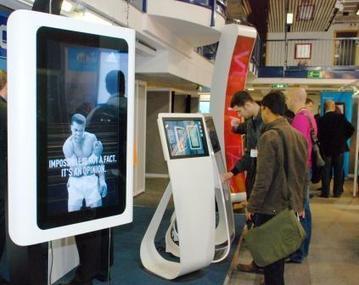This accredited CME Tweetorial presents a collection of individually threaded tweets addressing the high rate of influenza transmission among household members. It provides a comprehensive overview of transmission, exposure risk, and antiviral prevention strategies across the family unit.
Get Started for FREE
Sign up with Facebook Sign up with X
I don't have a Facebook or a X account


 Your new post is loading... Your new post is loading...
 Your new post is loading... Your new post is loading...
13th European CME Forum (#13ECF) – Virtual 4-6 November 2020 European and global CME: What next? We are putting together a fast-moving agenda where we ask the questions that are on everyone’s lips, difficult questions, curious question, or just your own question. We want to get to the what, where, when, who, what and how of CME in Europe across the globe. What is your question? But not just that, who would you like to answer it? Add your views in our annual CME survey, and use it to let us know your question about CME today. The Call for Abstracts is open, we are looking for interesting posters and short presentations that can support the main agenda of the meeting. You can find more information here and the application here. Closing date is Monday 5 October. The 13th Annual European CME Forum (#13ECF) is for anyone with an interest in European and global CME. We attract the key stakeholders in European and global CME-CPD/IME, regulators, associations and providers across Europe, North America and the world. This meeting is designed to meet the needs of anyone involved in, or interested in, European and global CME. Make sure you add your voice to the annual CME survey, there is a 10% discount code on the last page, and keep in touch by following us on Twitter and Linked In, or just email us — let us know what you would like to experience at #13ECF as we finalise plans. Day 1: Wednesday 4 November 2020 Opening of the 13th Annual European CME Forum Start: 12.00 CET (6.00am Eastern Standard Time/15.00 Gulf Standard Time) What do you want to know? A live needs assessment, including review of the Annual CME Survey (open to all to participate before the meeting), to ensure the meeting addresses the key questions, topics and concerns the participants identify. Session 1 start: 12.30 CET (6.30am EST/15.30 Gulf) Session 2 start 15.30 CET (10.00am EST/18.00 Gulf) Day 2: Thursday 5 November 2020 Session 3 start: 12.00 CET (6.00am EST/15.00 Gulf) Session 4 start 15.00 CET (9.30am EST/17.30 Gulf) Day 3: Friday 6 November 2020 Session 5 start: 12.00 CET (6.00am EST/15.00 Gulf) Session 6 start: 15.00 CET (9.30am EST/17.30 Gulf) Close: 17.00 CET (12.00 EST/20.00 Gulf)
Experienced users are convinced that engaging in interactive-heavy social media like Twitter—which can work synergistically with blogs and podcasts—can be an asset rather than a distraction for already busy hospitalists. |
BAUS is excited to announce that the BAUS 2020 Annual Meeting will be held virtually, with an exciting & dynamic programme and an interactive virtual platform. The BAUS 2020 virtual platform has been planned with a wide range of features: Activity wall Virtual exhibition Interactive home feed (for comments & photos) Discussion & comments area Augmented reality Live streaming of sessions Dynamic & exciting programme Polling Virtual 1:1 or group meetings Ability to watch for 12 months Activity challenge (win a pair of Apple AirPods) ... plus much more Abstracts will be available online in the Conference Edition of the Journal of Clinical Urology (JCU) from 07:00hr on Monday 9 November 2020 Programme There will be three sessions per day and three concurrent streams playing content during each session. Virtual exhibition viewing will be available between the sessons: SESSION 1 SESSION 2 SESSION 3 Mon 09 Nov view streams Tue 10 Nov view streams Wed 11 Nov view streams 08.00 - 10.00hr 08.00 - 10.30hr 08.30 - 10.00hr 12.00 - 14.45hr 12.00 - 14.45hr 12.00 - 14.00hr 16.00 - 18.00hr 16.00 - 18.00hr 16.00 - 18.00hr Download the full BAUS 2020 Virtual Final Programme Registration Click to register on-line for BAUS 2020 Virtual Registration for BAUS Members and Non-Members is now open. Registration is free for all BAUS Members and will be available until 10:00 (GMT) on 5 November 2020. Non-Member Fees Non-Member: Urologist / Other - Whole Meeting £50 Non-Member: Trainee/Health Care Professional, Nurses, Administrators, Radiographers/ Scientists/ Foundation & Core Trainees - Whole Meeting £25 BAUS 2020 Virtual Platform In the lead up to BAUS 2020 Virtual Annual Meeting, you will receive an email with a link to access the web app or mobile app. We have put together a How-to-Guide of the BAUS 2020 virtual platform to give delegates a detailed look into the user friendly features with step by step instructions. Download the BAUS 2020 How-to-Guide. Continuing Medical Education This meeting has been accredited with CME points as follows: Monday 9 November - 6 points Tuesday 10 November - 6 points Wednesday 11 November - 6 points ePosters Full details of the presenters and ePosters will be available to view on the meeting platform. For this year, ePoster sessions will run in a different manner. Each ePoster session has been allocated a 30-minute slot, where the co-chairs will provide a round-up review of the ePosters and will define the "take-home" messages and key discussion points. Social Media Keep up-to-date with all BAUS 2020 information via Twitter @BAUSUrology, use the hashtag #BAUS20 and view sessions on YouTube (BAUS TV). For additional information, please view the BAUS 2020 Virtual video below: This event is approved for CME Organised by: The BAUS Events Team of the British Association of Urological Surgeons
Using nursing tweetchats for CPD - again ! Monday 27th April 2015 by @AgencyNurse Waaaayyyy back in 2012 we wrote a little blog about How to get the best out of Twitter chats for CPD and since then we have been doing a whole heap of tweet chatting !!! However things have moved forward slightly and in the light of revalidation for nurses coming into force we thought it was about time we revisited our thoughts on Twitter chats and CPD. The use of social media for continuing professional development and learning is becoming more common place and accepted within healthcare as many have come to realise the knowledge exchange that occurs in these spaces. Moorley & Chinn (2014) state "Continuous professional development may use formal approaches to learning such as training sessions, classroom events (e.g. lectures) or education workshops. Informal learning may take the form of face to face conversations with colleagues or verbal feedback on actions or performance. As a result of the World Wide Web these approaches to knowledge sharing and transmission can extend to online environments. One such environment is social media using the platform Twitter. Twitter can be used as a learning resource; there are metrics that show healthcare conversations on Twitter. Symplur a provider of Health Care Social Media Analytics revealed there were 410 Million Healthcare Tweets." So with Twitter chats firmly placed on the CPD map here are a few tips to make the most out of them: 1. Be prepared - Have a read of the pre chat information for the Twitter chat you are going to participate in or watch. You can find out about all of the We Community chats coming up here, so read up ! 2. Take part - During the chat either get involved by taking part in the discussion maybe favourite some of their tweets to refer to later. Take a note on comments and people that got you thinking. 3. Feel free to lurk - Of course not everyone feels that they can actively take part in a Twitter chat, so feel free to lurk and watch the discussion, sometimes this can be just as valuable. 4. Reread, catchup and reflect - After the Tweetchat a transcript is produced and this allows you to go over the chat in your own pace and a reflect. A summary of the Tweetchat is also available afterwards - this is intended as a quick guide or reflection as to what the main points of the chat were. The transcript and summary are also handy if you missed the discussion but still want to read the main points. 5. Write your own summary / reflection - Reflect on what you have learnt, you may even like to blog or video blog about it, or simply print it out and add it to your portfolio. You can even share your own summary in the comment box under each We Community chat summary. The NMC's Provisional Revalidation Guidance states that you need to record the following: Date of CPD Number of hours Number of participatory hours CPD method Topic description & how it relates to my practice The identification of the relevant part of code the CPD relates to Evidence of activity You may also wish to include: Why did you think this chat would be relevant to you, what did you hope to gain? What twists and turns did the chat take, how did opinions differ from participants vary? Did you pick up any ideas to discuss with colleagues later, or even change the way you currently nurse? Do you need to do anything more to follow up your learning? We have created a very simple form that you can add to your portfolio to help you: Chose between a word version to complete digitally or a PDF version to print and complete For more information on revalidation please visit The NMC's Revalidation Guidance & Resources Posts Please feel free to post in to this blog; you'll need to be logged in via twitter from the top right of the menu to post. @{{Comment.screenName}} {{Comment.DateCreated | date:"dd MMMM yyyy HH:mm"}} {{Comment.Comment}}
From the very outset of the American College of Cardiology meeting, the hashtag #ACC16 began trending. Analytics from #ACC16 demonstrated that by the event’s end, there were nearly 3600 individual tweets, 35 million individual impressions, and roughly 1500 members participating via social media platforms such as Twitter. In other words, it’s quite clear that the ACC has embraced the digital space. And that’s as it should be. As cardiologists we are innovators and social media and digital engagement should be no exception. What follows is a look at how, in reflection of this, the ACC has folded this experience into its fabric. There was an average of 155 tweets per hour and many participants “live tweeted” during important presentations such as the late-breaking clinical trials sessions each day. Leadership in digital engagement was spread among individual attendees, Twitter feeds from the college itself, and feeds from institutions such as the Mayo and Cleveland Clinics. (Interestingly, the “Top 10 Influencers” by impressions were not the same as the Top 10 by tweets – suggesting that what you say may be more influential that how much you say in the digital space.) This investment in social media and mobile health extended to presentations as well. Researchers from Mayo clinic investigated whether or not patients undergoing cardiac rehabilitation would benefit from using specially designed health tools on their smartphones. In the study, 80 patients were randomized to a group having access to a smartphone mobile health tool with cardiac rehabilitation versus rehabilitation alone. Primary endpoint was total weight loss in the 12-week time period. The mobile tool group lost four times as much weight compared with those undergoing 12 weeks of cardiac rehabilitation alone. This randomized controlled trial is the first in the US to look at how using mobile and wireless devices concurrently with cardiac rehab might improve health outcomes – and clearly demonstrates the power of patient engagement via digital platforms. Additionally, social media sessions were included as part of the Annual Scientific Meetings academic programming. I was honored to chair and participate in the session alongside many distinguished colleagues. The session was well attended and each talk was delivered in a TED talk style format – emphasizing audience engagement, interaction, and story-telling. Slides contained images rather than charts, and each speaker shared real-world experiences and examples of social media and digital successes. Topics included the use of social media for connectivity, engagement, and innovation. The expanding use of mobile tools for the advancement of clinical trials was explored as well as issues surrounding direct patient engagement. What does this all mean? The future of social media in medicine is limitless – it is my hope that in 2017, we add to the numbers of active healthcare providers on social media. Ultimately, engagement can only help the people that we are pledged to serve – our patients. Through embracing our digital future in medicine, we can improve outcomes, improve disease awareness and access to care, and provide new tools for disease management. Let’s all be part of the leading edge of the bell curve. As Rogers shows us inDiffusion of Innovations, we must be the early adopters, not the laggards, if we truly want to maximize success. Dr. Kevin Campbell (Twitter: @DrKevinCampbell) is a partner at Wake Heart and Vascular and an assistant professor in the Division of Cardiology at University of North Carolina School of Medicine. He blogs regularly on his site, is a frequent contributor to The Doctor Blog, and is the Medical Expert for NBC17 and regular on air guest for Fox News, HLN, and CBS. He is the author of Women and Cardiovascular Disease: Addressing Disparities in Care. Via Plus91
Gilbert C FAURE's insight:
knowledge management?
|













